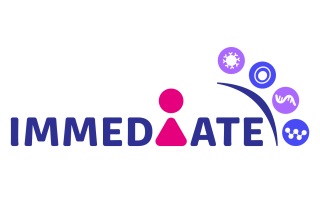Unravelling Key Factors of Chronic Inflammation and Predicting Health-to-Disease Transitions: Eurice Joins New EU Project IMMEDIATE
An unhealthy lifestyle, including a pro-inflammatory 'Western diet', physical inactivity, work-related stress, and other environmental factors have a major impact on our health. Going by the name of 'exposome', they are proven to largely drive chronic inflammation, resulting finally in organ dysfunction and clinical manifestations such as obesity, chronic kidney disease, cardiovascular disease, type 2 diabetes, and brain damage. To prevent non-communicable diseases, it is essential to identify individual biomarkers of risk and resilience against chronic inflammations as early as in the pre-symptomatic stage. Since the gut controls the regulation of inflammatory responses and dietary habits have emerged as the most relevant factor for health-to-disease transitions, the interface of diet, microbiota, and host is crucial to unravelling key factors for chronic inflammation. Yet, this so-called "diet-microbiome-metabolite-immune axis" still widely constitutes a "blind range of imminent disease."
Coordinated by Charité – Universitätsmedizin Berlin, the new EU research project IMMEDIATE aims to utilise and explore this axis as a sensor for health-to-disease transition to further our understanding of the mechanisms and molecular pathways underpinning disease and ultimately provide citizens with novel prevention strategies and tools. Bringing together 12 partner institutions from Europe, the UK, and Israel, the project is funded by the European Union's Framework Programme for Research and Innovation 'Horizon Europe' with a total budget of EUR 6.2 Mio over the next four years.
The project adds to Eurice's vast portfolio of health-related projects, specifically addressing the development of personalised medicine. "In a constantly changing world, disease prevention and our involvement in it as citizens also need to change. We are thrilled to be on board of IMMEDIATE, an ambitious project that will change how we predict and prevent chronic inflammation, with a vast impact on the health of citizens and healthcare systems," asserts Jörg Scherer, Managing Director of Eurice.
Gaining Insights into the "Blind Range of Imminent Disease"
Many of the environmental factors driving chronic inflammation and, thus, most non-communicable diseases are modifiable with great potential to benefit a person's health. However, in most cases, healthcare providers still act too far downstream in the health-to-disease transition process. Citizens usually do not seek medical help before a manifested organ dysfunction results in clinical symptoms. Moreover, individual risk and resilience profiles for health-to-disease transition are largely unknown and cannot be simply inferred from visible factors (such as age, sex, BMI, smoking, etc.). Against this backdrop, research into the blind range of imminent disease holds great potential for identifying more accurate, personalised risk/resilience profiles.
Taking advantage of cutting-edge omics technologies in combination with ample clinical data and biospecimens from ongoing observational cohort studies, the IMMEDIATE research team will shed light on this blind range – a pre-disease stage during which end-organ damage and clinically symptomatic disease can presumably still be successfully prevented by appropriate interventions including dietary and lifestyle modifications.
From Large-Scale Data Analyses and Proof-of-Concept to Personalised Prevention Strategies
The combined effects of lifestyle, nutrition, occupation, social, psychosocial, and genetic factors on health-to-disease transitions can only be studied effectively in trials conducted on large, statistically representative cohorts and over a sufficiently long period of time. IMMEDIATE will therefore apply machine learning and artificial intelligence (AI) to three existing large prospective studies: 10k (Israel), NAKO, and KTX360°C (Germany). The AI-based analysis of these cohorts will provide significantly large datasets regarding populations with diverse ancestries that live in different geographic regions and have different lifestyle habits (e.g., diet, smoking, and alcohol consumption), thereby enabling the definition of risk and resilience profiles for chronic inflammation.
In order to test the beneficial, anti-inflammatory effect of a microbial intervention, IMMEDIATE will then conduct a proof-of-concept human study on a population of healthcare professionals (e.g., physicians, nurses, and paramedics) who are exposed to high and regular levels of stress. The goal is to demonstrate the improvement of health outcomes on the risk profiles for chronic inflammation identified in the prospective studies. Moreover, the study will enable the optimisation of mobile apps designed by the IMMEDIATE consortium to offer personalised lifestyle recommendations and to help citizens manage their own health proactively.
Find out more about IMMEDIATE at www.immediate-project.eu and follow us on LinkedIn.
